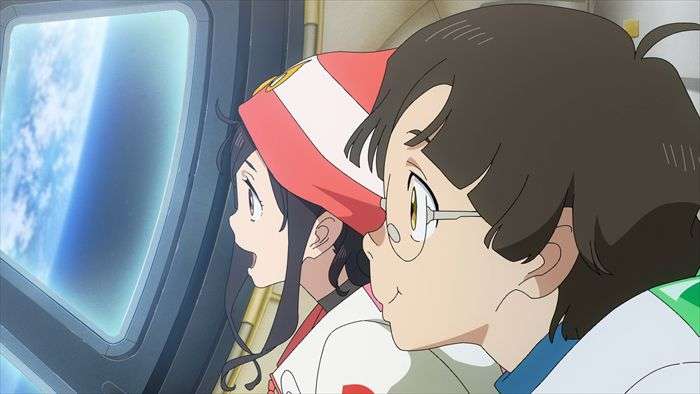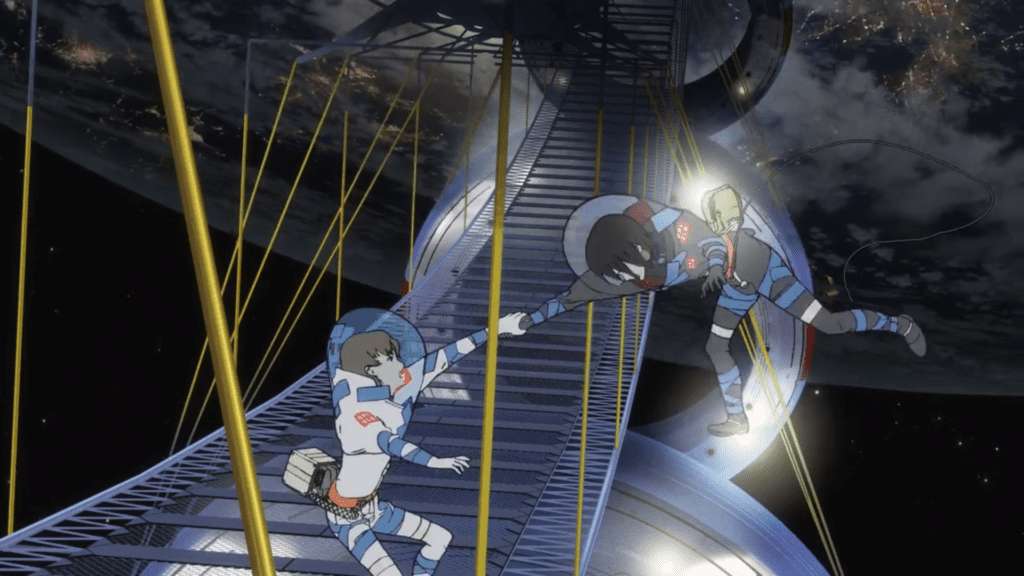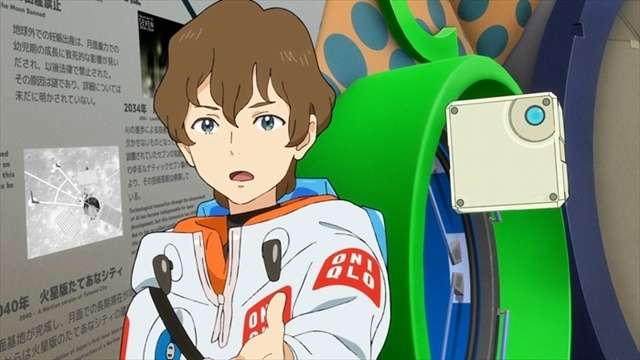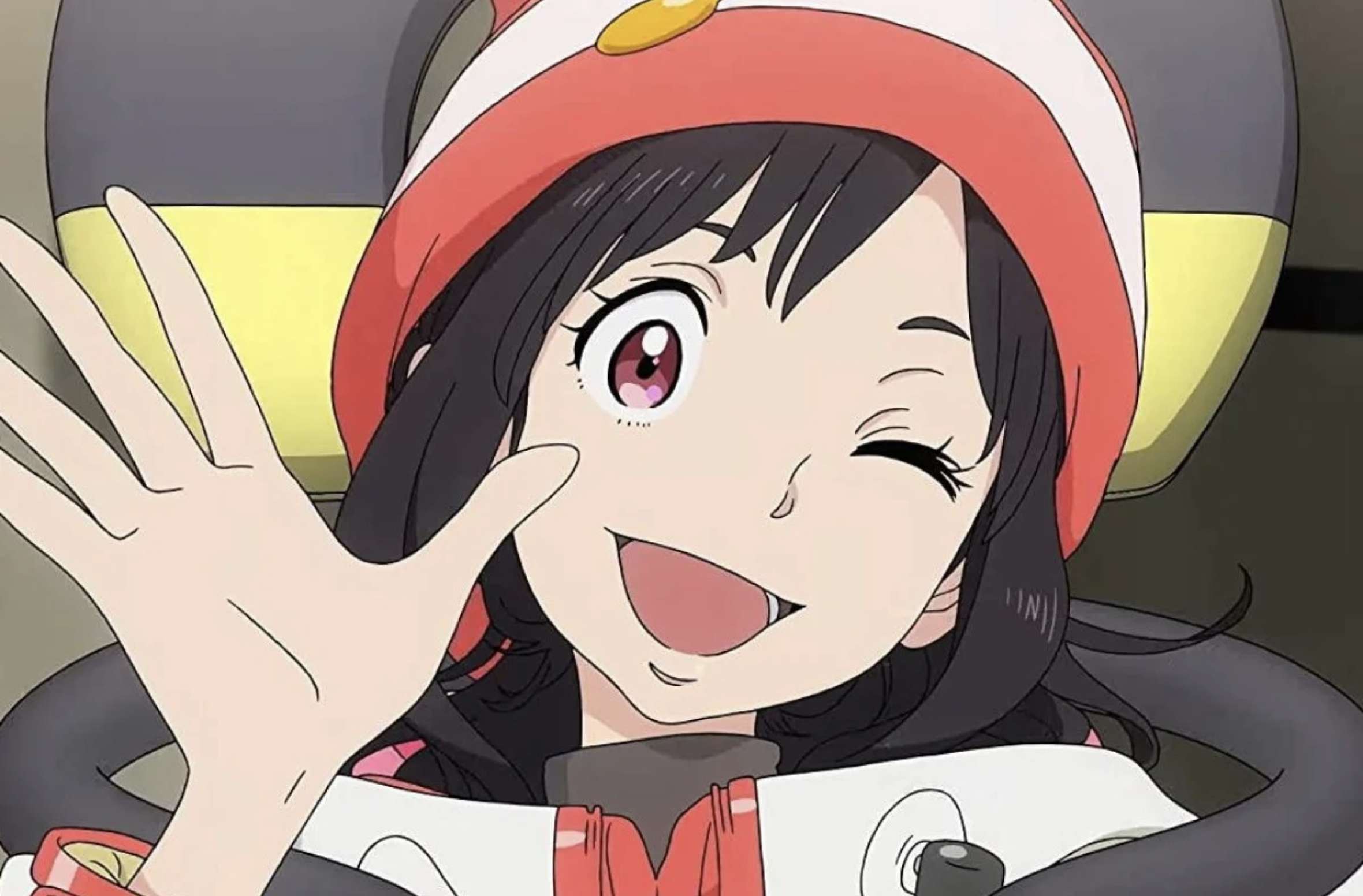When I learned that the creator of 2007’s Dennou Coil had a new work available this season for instant viewing, I was ecstatic. I don’t normally hold to Netflix’s handling of anime—all at once at the end of the season rather than weekly with release date—but instances like this are a bit of an exception. Rather than the anime airing a full season earlier and announced at the end when fans are already looking to the next, Netflix-produced series like these drop at the same time as their announcement so fans don’t have to wait an annoyingly long time to consume and still remain on schedule with other currently airing shows.
I wish I could say that I fell in love with The Orbital Children (TOC from here on) given its shared space with its predecessor, but that simply wasn’t the case. I fell instead into the hole that is inflated expectations—I thought I’d receive another groundbreaking and tastefully written story, but quickly felt annoyed and dissatisfied with the characters, language, and pacing. I can’t say I fully regret watching TOC since it’s a mere six episodes (2 films in Japan) that ask worthwhile questions; I only wish the writing lived up to my hopes.
Mitsuo Iso is a bit of a giant in the anime industry with works like various Gundam series, classic Ghibli films, Evangelion, and Ghost in the Shell on his list in addition of the already aforementioned Dennou Coil. The final entry is of particular note because not only did he direct the series, he also wrote the original work and script, winning multiple science fiction awards in doing so. I remember when first watching Dennou Coil how blown away I was by the idea of augmented reality, which felt like a wholly new technology in a world where previously only full virtual reality had been explored. The kids’ use of glasses to cross virtual and real worlds came several years before Google Glass, HoloLens, and other like technologies. These characters were relatable and their adventures exciting. We didn’t have to go into a fully fantastical world to start our adventures; we could experience our own journeys in the familiar.
With the former work taking place on Earth, I thought I’d feel a similar sense of wonder and adventure in TOC, only in space. The first episode does provide that to an extent, but the wonderment was quickly supplanted by irritation at a few of the characters, namely Touya, Taiyo, and Mina. I’m willing to admit now that some of the annoyance may stem from accurate representation of their ages; who wasn’t a little bratty as a young teenager? Like Nasa, I’ve long claimed dislike for children, but the reality is that I just don’t like kids in their most natural forms—curious, accident-prone, but thoroughly in their elements as they learn about the world around them. I’ve obviously softened in my stance as I’ve gotten older, but I still tend to prefer quieter, more thoughtful personalities like Konoha.
In addition to my almost immediate desire to smack all technology out of Mina’s hands, I also was repulsed by the excessive UNIQLO advertisement peppering the screen. I actually really like UNIQLO products—their classic look is timeless and adaptable. However, TOC wanted me to gag on the brand as primary producer of space textiles like spacesuits and tents. I often found myself staring at the bright red logo instead of listening to arguably more important explanations of Seven and John Doe. Spacefaring books like Ender’s Game and anime series like Stellvia of the Universe are also led by children who end up fighting battles for humanity. I never felt distracted in either work by branding. I might have noticed an odd design choice here or there, but never enough to pull my attentions away from what really mattered.
Something else these other works did better than TOC was their use of language. While they certainly had their own vernacular integral to understanding the world and their roles, I once again never felt stifled by acronyms or oft-repeated terminology. I dare you to take a single episode of TOC and drink a tequila shot every time they mentioned Seven, or poem, or frame. You will mostly likely pass out with an extreme case of alcohol poisoning.
My review my seem indicative of a strong dislike for TOC, but that isn’t true. I do appreciate it visually and thematically, as pretentious as the lessons can be at times. I can never think poorly on a work that provokes me into a decent amount of thought days after completion. While the last couple of episodes felt rushed and difficult to process in the moment, I can see where they wanted to go and the questions they wanted us to ask ourselves.
Are humans doomed to destroyed themselves?
Maybe we are. This show certainly seems to think that to be the case since the AI ended up masterminding the “removal” of a third of the world’s population not by asteroid death, but by space exploration. I personally do think humans tend to destroy the environment for our own betterment, and frequently use organized religion and superstition to harmful results.
Do we need a higher being to survive?
Yes and no. I do not believe in any higher existence, but do have friends and family who adhere to some form of religion or spirituality in their day-to-day lives. I believe humans crave a community, and some lack the self-reliance to build or seek those communities without using a higher power as a focus point. In TOC, AI like Seven, Twelve, and Second Seven fill that role.
Should we limit knowledge?
I’ve never believed in limiting knowledge, but I do think rules are necessary to prevent loss of life. Was Seven’s initial proposition of removing 1/3 of Earth’s population wrong? On a fundamental level I don’t think so; it’s the method that creates the problem. Death as removal is obviously not the right answer. Scaring humanity into believing death as the solution obviously wasn’t a great choice, either, since it gave rise to groups like John Doe.
While these questions are always worth consideration, the manner in which they were presented didn’t feel as artfully crafted as I would have hoped. TOC fell into an odd space where I wanted either less or more. If it asked less lofty questions, perhaps the story would have fit better into a single film, or three episodes. If they took the necessary time to fully explore all the ideas they raised, then they could have easily filled a full season of episodes.
Perhaps many years from now I’ll revisit The Orbital Children and think more favorably on the presentation. But for now, other connected works resonate more strongly and outshine these gaudy wrappings. If viewers are newer to science fiction works in anime, then TOC might serve decently well as a stepping stone into the genre.
Rating: 0 dango
*Rating system:
- 0 dango – average and forgettable.
- 1 dango – very good in its category.
- 2 dango – excellent show that is worth a try.
- 3 dango – exceptional show one must watch.





[…] [Review] The Orbital Children and Inflated Expectations by Marina (Anime B&B): Do you ever see a book or series and think “wow, that cover looks amazing, I hope it IS amazing”? That’s sort of how I felt when I checked out this post but I guess it wasn’t meant to be. And yet, I still want to watch it. This sounds like a pretty interesting anime and if it flops for me, feel free to say, Marina told you so! Also, really interesting rating system!! […]
LikeLike